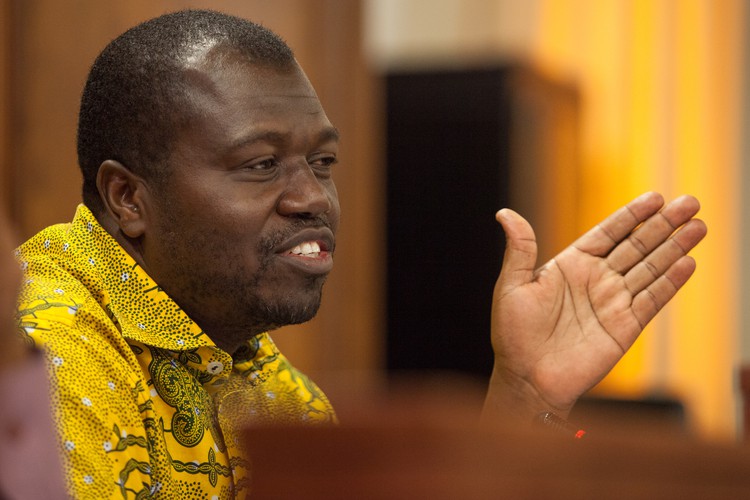
Themba Godi, chairperson of the Standing Committee On Public Accounts (SCOPA), said Eskom, SABC and SAA are priorities for his committee this term. Archive photo: Ashraf Hendricks
2 August 2017
Parliament’s Standing Committee on Public Accounts (Scopa) made it clear in a press briefing on Tuesday that the Hawks and the National Prosecuting Authority are not meeting its expectations and it wants to see improved results and “consequences” taken against those who abuse state funds.
With Parliament’s third term barely begun, Scopa chairperson Themba Godi called a press briefing to identify the Committee’s priorities for the upcoming quarter. These include Eskom, the SABC and South African Airways.
Another focus will be National Treasury, including its stalled Integrated Financial Management System to integrate human resource and financial management systems across government. The failed first phase of this project has already wasted expenditure of more than R1 billion.
Another target for Scopa will be the Department of Water and Sanitation, which it described as “in shambles, lacking leadership and literally bankrupt”.
Godi also expressed regret at the departure of former SASSA CEO Thokozani Magwaza and said SASSA “might not be moving in the right direction and at the right speed,” a matter he has raised in a letter to Chief Justice Mogoeng Mogoeng.
Godi stated that Magwaza’s departure has caused anxiety over whether SASSA would fulfil its obligation towards the Constitutional Court’s ruling and public desire for the Post Office to handle the distribution of social grants.
Scopa supports harsher sentences for those who are found guilty of mishandling government funds. The Committee wants to engage with the Anti-Corruption Unit for harsher consequences, including amending the power of the Auditor General to create legally binding time frames on accountability.
Asked whether various ministers would be called to Parliament, Godi said, “it is unbecoming of any ministers not to heed the call of Parliament”. The ministers will have to appear before Scopa once dates for this term have been confirmed.
In a statement, Scopa said there are no holy cows and abuse of state funds must result in “investigation, charging and imprisonment, irrespective of which corner of the country they come from or their status in society.”
It said Scopa’s “unyielding focus” is the “fight against corruption and the protection of the public purse.”
Scopa sees itself as Parliament’s lead organ in the fight against corruption, guided by the Constitution, The Public Finance Management Act and the Rules of the National Assembly.
Committee member Dr Mnyamezeli Booi said “our relationship with the security agencies is to continuously emphasis to them that they must do their work.
“We have said to NPA and the Hawks we are expecting more than what you are doing. We want faster results. Society is waiting for consequences.”
He said Scopa’s work does not end with Committee hearings. It follows up and engages with security agencies that it believes are “not working hard enough”.
Godi described Scopa’s “escalating model” in which incidents of wasteful and fruitless expenditure will be escalated to the government minister and if necessary to the Head of Government Business. “If the Head of Government Business does not respond we must then report to Parliament that as a Committee we have no confidence in the minister”.